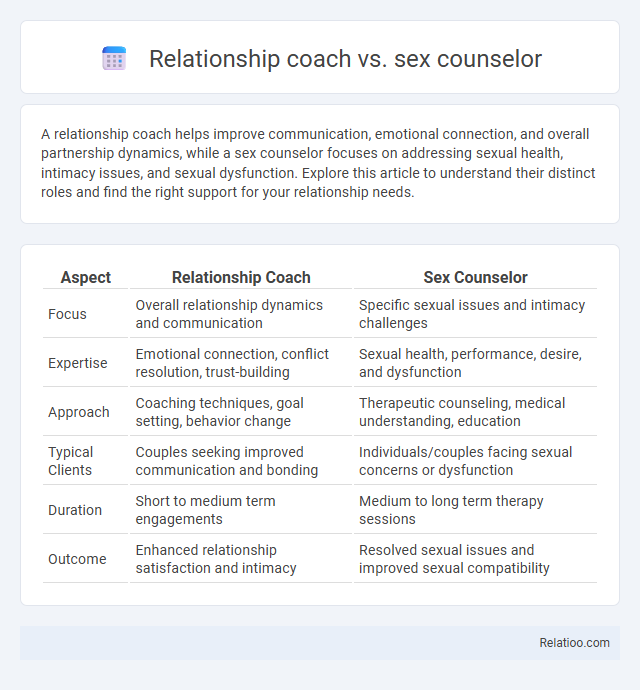A relationship coach helps improve communication, emotional connection, and overall partnership dynamics, while a sex counselor focuses on addressing sexual health, intimacy issues, and sexual dysfunction. Explore this article to understand their distinct roles and find the right support for your relationship needs.
Table of Comparison
| Aspect | Relationship Coach | Sex Counselor |
|---|---|---|
| Focus | Overall relationship dynamics and communication | Specific sexual issues and intimacy challenges |
| Expertise | Emotional connection, conflict resolution, trust-building | Sexual health, performance, desire, and dysfunction |
| Approach | Coaching techniques, goal setting, behavior change | Therapeutic counseling, medical understanding, education |
| Typical Clients | Couples seeking improved communication and bonding | Individuals/couples facing sexual concerns or dysfunction |
| Duration | Short to medium term engagements | Medium to long term therapy sessions |
| Outcome | Enhanced relationship satisfaction and intimacy | Resolved sexual issues and improved sexual compatibility |
Understanding the Roles: Relationship Coach vs Sex Counselor
Relationship coaches focus on improving communication, conflict resolution, and emotional intimacy within partnerships, guiding clients toward healthier connections and personal growth. Sex counselors specialize in addressing sexual health concerns, dysfunctions, and intimacy issues, often incorporating psychological and physiological approaches to improve sexual well-being. Understanding the distinct roles helps individuals choose the right professional based on their needs--whether enhancing overall relationship dynamics or targeting specific sexual challenges.
Key Differences Between Relationship Coaching and Sex Counseling
Relationship coaching focuses on improving communication, trust, and emotional intimacy within your partnership, addressing broader relational challenges. Sex counseling specifically targets sexual issues such as performance anxiety, intimacy problems, or sexual dysfunction, using therapeutic techniques to resolve physical and emotional sexual concerns. While relationship coaches guide you to build stronger connections and personal growth, sex counselors provide clinical interventions for sexual health and well-being.
When to Choose a Relationship Coach
A relationship coach helps you improve communication, build trust, and navigate conflicts to strengthen your partnership, making them ideal when your goal is to enhance overall relationship dynamics. A sex counselor addresses sexual issues such as intimacy problems, sexual dysfunction, or trauma, focusing on the physical and emotional aspects of your sexual health. Choose a relationship coach when your primary need is personal growth within the relationship rather than specific sexual concerns that require specialized therapeutic intervention.
When to Seek a Sex Counselor
You should seek a sex counselor when facing specific sexual difficulties such as performance anxiety, low libido, or intimacy issues that affect your relationship quality. Unlike relationship coaches who focus on communication and emotional connection, or broader sex counselors who may address general sexual health, a sex counselor provides targeted therapy for sexual dysfunction and emotional blocks related to sexuality. Early intervention with a certified sex counselor can improve sexual satisfaction and enhance overall relationship harmony.
Qualifications and Certifications: What Sets Them Apart
Relationship coaches typically hold certifications from coaching institutes such as the International Coach Federation (ICF) and focus on communication and conflict resolution skills without requiring formal licenses. Sex counselors often possess specialized training in sex therapy and may be licensed mental health professionals, holding certifications from organizations like the American Association of Sexuality Educators, Counselors and Therapists (AASECT). Your choice should consider these distinctions, as relationship coaches guide interpersonal dynamics broadly, while sex counselors provide clinically informed interventions for sexual health issues.
How Each Professional Approaches Communication Issues
Relationship coaches emphasize enhancing overall communication skills within the partnership, focusing on conflict resolution, active listening, and emotional expression to strengthen bonds. Sex counselors target communication specifically around sexual intimacy, helping partners articulate desires, boundaries, and concerns to improve sexual satisfaction and understanding. While sex counselors address sexual communication in the context of emotional and relational dynamics, they are often more specialized in navigating complex sexual issues, compared to relationship coaches who take a broader relational approach.
Addressing Intimacy: Who Does It Better?
Relationship coaches focus on broader emotional and communication issues to enhance overall intimacy between partners, whereas sex counselors specialize in diagnosing and treating sexual dysfunctions and promoting a healthy sexual relationship. Sex therapists, often with advanced clinical training, combine psychological and medical knowledge to address complex intimacy challenges by integrating mental health with sexual well-being. For addressing intimacy comprehensively, sex counselors and therapists generally provide more targeted interventions, while relationship coaches offer ongoing support for relational dynamics.
Cost and Commitment: What to Expect
Relationship coaches typically offer flexible sessions ranging from $75 to $150, requiring minimal long-term commitment to improve communication and emotional connections. Sex counselors often charge between $100 and $200 per hour and may suggest a commitment of several weeks to address specific sexual concerns. Your choice should consider both budget and dedication level to achieve desired outcomes in emotional and sexual well-being.
Combining Services: Can They Work Together?
Relationship coaches, sex counselors, and therapists each offer distinct expertise that can complement one another when addressing complex intimacy and emotional challenges. Combining services allows you to benefit from holistic support, integrating communication skills, sexual health guidance, and emotional healing to enrich your relationship. Collaborative efforts between these professionals can create a comprehensive plan tailored to your unique needs, enhancing overall relationship satisfaction and personal well-being.
Making the Right Choice for Your Relationship Needs
Choosing between a relationship coach, sex counselor, or sex therapist depends on Your specific needs: relationship coaches focus on improving communication and emotional connection, while sex counselors address sexual concerns and intimacy issues. Sex therapists provide specialized therapy for more complex sexual dysfunctions and emotional difficulties related to sexuality. Understanding the scope of each professional's expertise ensures effective support tailored to Your relationship's unique challenges.

Infographic: Relationship coach vs sex counselor
 relatioo.com
relatioo.com